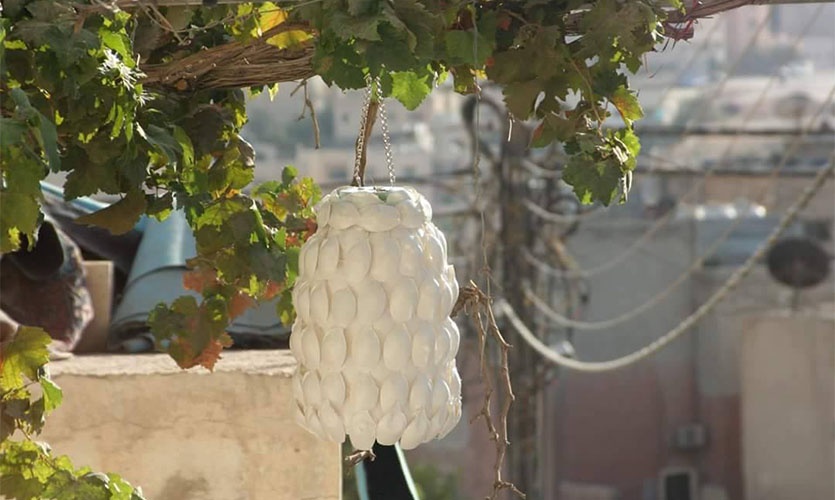Decorating Jordan’s homes with its trash

It all started in one of the oldest bookstands in downtown Amman when unemployed Alaa Ziadeh decided to build things... using his city's garbage.
Ziadeh was frustrated and worn out of his spatial engineering diploma that got him nothing but a one year contract in Al-Zarqa’a, a city north of Amman. He had taken it with the hope that he’d find a better job down the line but after one year, he found nothing.
“You need experience to work and you need work to get experience. I didn’t have either, one year does not count,” he said during an interview with Wamda.
With no work, Ziadeh would often vent to his bookseller friend, Saher. Eventually they cut a deal where Saher allowed his friend to sell upcycled objects at a bookstand in his store. Upcycling is when old material (or trash) is reused to create something new, useful - and in this case, also beautiful.
His first upcycled piece required him to go through the trash of a renowned knafeh place, Habiba, looking for plastic spoons.
“Everyone was staring at me like I was some kind of lunatic,” he said. He took the spoons, cleaned them and built his first light shade.

In 2014, Ziadeh established his own brand for upcycled furniture: Ziadat for Recycling. By then he was picking trash from the streets and when garbage was no longer fruitful, he dig into his own pockets to buy material from scrap shops.
"I started pursuing my dream with a 4 JD silicon gun and now I have a machine worth 1200 JD (nearly $1,700). I can see myself growing. I feel that I am accomplishing, I am doing something, I am building,” he said.
Although Ziadeh and his customers see the value in waste, the general mentality of his surrounding community is off track. “People still think I work with trash,” the designer said, expressing his disappointment in their demeaning tone.
Similarly, this type of culture did not make green startups very appealing, said Jemma Grayburn, senior business development officer at entrepreneurship enabler BDC. Environmentally friendly design was considered costly and unfashionable, she added.
BDC is working with 172 entrepreneurs seeking to establish businesses in the environmental sector as part of Switchmed’s green training program and in collaboration with Jordan’s ministry of environment.

The participants are offered guidance and supervision on developing their ideas into a successful green businesses. Most ideas are related to agriculture, solar energy, green architecture, and local food produce.
Waste: how much have we got?
According to a 2012 World Bank report, the global average solid waste generated per person equals to 1.2 kg/day and is expected to reach 1.42kg/day by 2025.
Out of 15 arab countries, whose results have been taken between 2011 and 2013, the UAE, Kuwait and Qatar produced the greatest amounts of waste, UAE topping the list with 2.2kg/day - exceeding countries like Germany (1.69 kg/day) and Sweden (1.25kg/day).
When waste is left unmanaged through recycling, incineration, or gasification, it poses serious health risks. For example, waste in an unmanaged landfill produces greenhouse gases and can eventually contaminate groundwater that we depend on for drinking.

Despite the dangers of waste, it can also be used to create a lot of energy; three tonnes of waste produce one tonne of fuel oil.
Such value encouraged countries like Sweden to commodify waste by selling a service to import 800,000 tonnes of waste every year. Only 1 percent of the country's trash is sent to landfills, the rest is either recycled or converted into energy.
How can the private sector help?
Waste management in Jordan was underserved and still not properly invested in, said Buthaina Aburoza, founder of Qutoof, a nonprofit that provides vocational training on waste management.
“With the increased number of refugees and the many problems we have in the field, the government is in need of civil society and private sector intervention,” she said.
Such intervention can address three different needs.
First there is the vocational challenge in which the private sector can encourage more people into the profession, in addition to training those who are already working in the field such as garbage collectors.
Second, Jordan needed people to work on organizing the waste management process, Aburoza said. The logistics and practicalities need to be explained for people in order to facilitate green methods like recycling.

Third, startups and companies should be working on raising people’s awareness about the importance of reducing waste and managing it.
“When you combine the drive to create and have a business and be financially sustainable with the idea of protecting and healing your environment, it can be very very powerful,” said Julien Troussier, cofounder of Earthworm, a community intending to turn vermicomposting into a micro enterprise in Palestine.
“The two actually really go together, they shouldn’t oppose each other, which is too often the case in the general discourse: it’s either business or the environment, people or nature, we really don’t believe that’s the case.”
Other startups working in the waste management field include: Nproducts for upcycled products, Waste-lb which sells accessories and furniture made out of advertising banners, Retyres that recycles tires, and Recyclobekia for the recycling of electronic waste.


